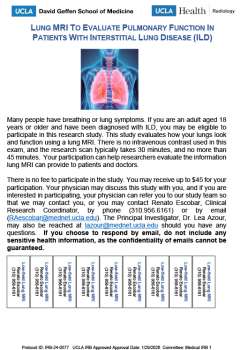Clinical Trials
UCLA Radiological Sciences is engaged in investigating new approaches to diagnosing and treating diseases and conditions.

The clinical trials are done in close collaboration with scientists and physicians from many areas of expertise. All trials are overseen by the Institutional Review Board (IRB) to ensure the highest ethical standards.
The following lists the clinical trials that are currently recruiting participants:
Lung MRI to Evaluate Pulmonary Function in Patients with Interstitial Lung Disease (ILD)

Many people have breathing or lung symptoms. If you are an adult aged 18 years or older and have been diagnosed with ILD, you may be eligible to participate in this research study. This study evaluates how your lungs look and function using a lung MRI. There is no intravenous contrast used in this exam, and the research scan typically takes 30 minutes, and no more than 45 minutes. Your participation can help researchers evaluate the information lung MRI can provide to patients and doctors.
There is no fee to participate in the study. You may receive up to $45 for your participation. Your physician may discuss this study with you, and if you are interested in participating, your physician can refer you to our study team so that we may contact you, or you may contact Renato Escobar, Clinical Research Coordinator, by phone (310.956.6161) or by email ([email protected]). The Principal Investigator, Dr. Lea Azour, may also be reached at [email protected] should you have any questions. If you choose to respond by email, do not include any sensitive health information, as the confidentiality of emails cannot be guaranteed
Principal Investigator: Lea Azour, MD, [email protected]
Contact:
Renato Escobar, 310-956-6161, [email protected]
Hemorrhoidal Artery Embolization: Longitudinal Impact On Symptoms (HELIOS)
Hemorrhoidal artery embolization (HAE) is a novel treatment for symptomatic internal hemorrhoids. HAE involves the deliberate blockage (embolization) of enlarged rectal or hemorrhoidal arteries leading to reduction of abnormal blood flow to the hemorrhoidal tissue. The aim of HAE is to the improve hemorrhoid related symptoms, especially bleeding. Initial reports of HAE have demonstrated that it both safe and effective. Following an initial clinic visit to determine trial candidacy, enrolled patients will be subsequently treated with HAE. Patients will be followed for a year with clinic follow-up visits at 1, 3, 6 and 12 months.
ClinicalTrials.gov identifier: NCT07179601
Principal Investigator: Lucas Cusumano, MD
Contact:
Renato Escobar, [email protected]
Saima Chaabane, [email protected]
If interested, please check out the eligibility criteria on ClinicalTrials.gov.
Utilizing Advocates and Supporters to Increase Lung Cancer Screening Rates in Eligible Participants
This clinical trial assesses the use of advocates and supporters of breast and lung cancer screening to increase lung cancer screening rates amongst eligible participants. Imaging-based cancer screening is utilized with variable frequency. Breast cancer screening with mammography has been widely accepted and is commonly used among eligible women. Lung screening with computed tomography scans is poorly used, despite the potential to decrease deaths from lung cancer. There are many reasons lung screening isn't being used when compared to breast screening, such as smoking stigma and fear, along with a lack of awareness of lung screening. By conducting this trial, researchers want to assess the effectiveness of advocates and supporters of breast and lung screening, and to learn about the psychological barriers to cancer screening, identifying those that are unique to lung screening.
ClinicalTrials.gov identifier: NCT05978128
Principal Investigator: Ashley Prosper, MD
Contact:
Ashley Prosper, MD, 310-825-0958, [email protected]
If interested, please check out the eligibility criteria on ClinicalTrials.gov.
"Yttrium-90 (Y90) Radioembolization for the Treatment of Early Stage Renal Cell Carcinoma, The RENEGADE Trial "
This phase I/II trial tests the safety, side effects and effectiveness of radioembolization with yttrium-90 (Y-90) in patients with early stage renal cell carcinoma. Y-90 is a radioactive chemical that is incorporated into millions of very tiny glass spheres. These spheres are injected into the artery that feeds the cancer. This process is called radioembolization. Y-90 radioembolization may be a safe and effective treatment for patients with early stage renal cell carcinoma.
Patients undergo radioembolization with yttrium Y 90 glass microspheres (TheraSphere) given intra-arterially. Patients undergo angiogram during screening, single proton emission computed tomography (SPECT) scan on study and computed tomography (CT) scan and blood sample collection throughout the study.
After completion of study treatment, patients are followed up at 1 day, 1 week, and then monthly for 24 months.
ClinicalTrials.gov identifier: NCT06432036
Principal Investigator: Siddharth A. Padia, MD
Contact:
Arshia A. Mian, 310-906-6028, [email protected]
Saima Chaabane, (310)794-8995, [email protected]
If interested, please check out the eligibility criteria on ClinicalTrials.gov.
Genicular Artery Embolization Vs Observation for Symptomatic Knee Osteoarthritis (GRAVITY)
The purpose of this clinical trial is to determine whether genicular artery embolization (GAE) is an effective way to treat knee pain from osteoarthritis. Pain from arthritis is often due to underlying inflammation in the joint. The inflammation is associated with increased abnormal blood flow going to the specific area of pain. If the investigator can reduce the blood flow, the inflammation can be reduced and the pain can be controlled.
The GAE procedure is an experimental procedure to decrease the blood flow (embolize) to the specific region of the knee that is causing the pain. This will be done by infusing microscopic spheres into the specific blood vessel (genicular artery) supplying the area of pain in the knee. This is done through a procedure which is called an angiogram, which is done entirely through a pinhole at the creased of the thigh, using twilight (conscious) sedation.
The investigators have already completed an initial trial at UCLA, and shown that this procedure is safe and effective. The purpose of this new trial is to compare outcomes of people undergoing the GAE procedure to those who do not undergo the procedure. A total of 100 patients will be enrolled, and 2/3 of the patients will be randomly selected to undergo the GAE procedure. 1/3 will not undergo the procedure. This is known as a randomized trial. During the trial, all subjects will also get MRIs and fluid withdrawn from their knee joints at various timepoints in order to precisely figure out how the procedure works on a closer (microscopic) level.
ClinicalTrials.gov Identifier: NCT04682652
Principal Investigator: Siddharth Padia, M.D.
Contact:
Aniket Joglekar, 310-948-8026, [email protected]
Saima Chaabane, PhD, 424-465-4482, [email protected]
If interested, please check out the eligibility criteria on ClinicalTrials.gov and contact Aniket or Saima for more information.
Elbow Artery Embolization for Tennis Elbow
The purpose of this clinical research study is to examine whether embolization treatment of an elbow artery is a safe and effective way to treat elbow pain, specifically pain from tennis elbow. Embozene is a medical device made by Varian marketed in the United States for the treatment of hypervascular tumors and arteriovenous malformations. It consists of thousands of microscopic spheres that are injected into the artery to block the flow of blood to a specific region. One of the causes of pain in the setting of tennis elbow is increased blood flow going to the specific area of pain. In this study, we will investigate an experimental procedure to decrease the blood flow (embolize) to the specific region of the elbow that is causing the pain. This will be done by infusing Embozene particles into the specific blood vessel supplying the area of pain in the elbow. This is an investigational study to evaluate the safety and efficacy of elbow artery embolization (EAE) for the treatment of symptomatic lateral epicondylitis (tennis elbow).
ClinicalTrials.gov Identifier: NCT05325242
Principal Investigator: Siddharth Padia, M.D.
Contact:
Purva Joshi, 424-402-6599, [email protected]
Aniket Joglekar, 310-948-8026, [email protected]
If interested, please check out the eligibility criteria on ClinicalTrials.gov and contact Purva or Aniket for more information.
Simultaneous Multinuclear Metabolic MRI in Newly Diagnosed or Recurrent Glioma
This clinical trial constructs and tests a novel multinuclear metabolic magnetic resonance imaging (MRI) sequence in patients with glioma (brain tumor) that is newly diagnosed or has come back (recurrent). This trial aims to develop new diagnostic imaging technology that may bridge gaps between early detection and diagnosis, prognosis, and treatment in brain cancer.
ClinicalTrials.gov identifier: NCT05045027
Principal Investigator: Benjamin M. Ellingson
Contact:
Saima Chaabane, 310-794-8995, [email protected]
Raksha Nagaraj, 310-562-9752, [email protected]
If interested, please check out the eligibility criteria on ClinicalTrials.gov.
Integrating Quantitative MRI and Artificial Intelligence to Improve Prostate Cancer Classification
This study evaluates how new magnetic resonance imaging (MRI) and artificial intelligence techniques improve the image quality and quantitative information for future prostate MRI exams in patients with suspicious of confirmed prostate cancer. The MRI and artificial intelligence techniques developed in this study may improve the accuracy in diagnosing prostate cancer in the future using less invasive techniques than what is currently used.
ClinicalTrials.gov identifier: NCT04765150
Principal Investigator: Kyung H Sung, PhD
Contact: Nashla Barroso, 310-794-7952, [email protected]
If interested, please check out the eligibility criteria on ClinicalTrials.gov.